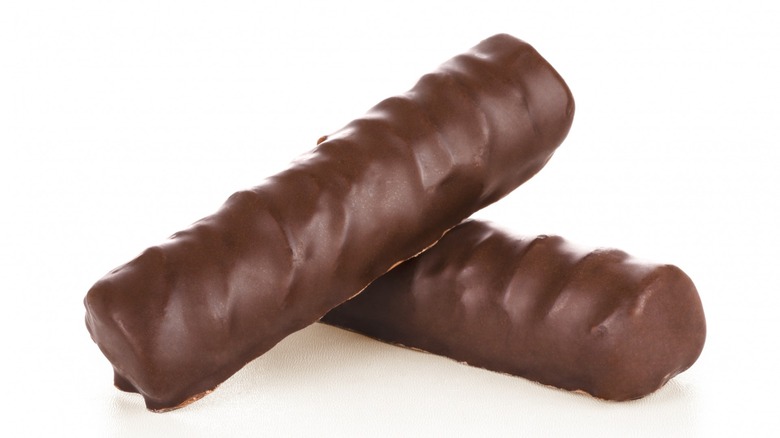The Messy Reason Summit Bars May Have Been Discontinued
Candy bars come and go, unfortunately. For every tasty snack treat found in a local sweets aisle or hanging out on a rack by the checkout counter, there are just as many discontinued candy bars that are nothing but a long-distant memory. Moreover, your definition of the best-discontinued candy may vary depending on how far back that recollection goes, mainly if the snack food left the market before you were born. It's no surprise that Mars' Summit Cookie Bars fall into that category for many who were of snacking age in the '70s and '80s. However, despite having cult-like status among those that remember them, there may be a messy explanation behind their disappearance, and it's related to another Mars candy (M&Ms and its slogan, "Melts in your mouth, not in your hands").
Mars launched Summit Cookie Bars in 1977, and although it was initially labeled as a cookie product, it was eventually advertised as a candy, which is appropriate since the treat itself was an amalgamation of the two. While it was seemingly popular, storage issues and its sensitivity to heat appear to be what ultimately doomed this confection. Writing for KXRB, Randy McDaniel notes that "They melted. And I mean melted fast. They didn't even wait for your hand, they melted right there in the package."
The taste of Summit Candy Bars and issues with consumers
If you've never had the opportunity to try Summit, the candy can be similarly compared to two other products: Nestlé's and Hersey's Kit Kat bar and Mars' Twix bars. The likeness makes sense, considering it consisted of two cookies constructed from layered wafers and a confectionary cream topped with roasted peanuts and coated in chocolate. Nevertheless, although contemporary reports, like the one found in marketing professor Robert E. Linneman's book, "Making Niche Marketing Work," (published in 1991, the same year Summit was discontinued), suggest that Mars had a hit candy on its hands with revenue from purchases presumed to be around $40 million, the issue that consumers had with the bars melting so easily may have contributed to its demise.
For instance, consumer John Maye told the Wilmington Star News in 1983 that Summit had to be stored in the freezer to prevent softening. Although storing candy bars in the freezer can be a novelty, a candy bar that needs to be refrigerated to prevent melting isn't particularly convenient. As a result, this may have been the final nail in the proverbial coffin for the treat, despite Mars' attempts at revamping the product that year with an updated foil wrapper and formula that boasted more chocolate, especially since almost no one could tell the difference.
Mars discontinued Summit and focused on brand-building
Although Mars started to shift gears with a focus on the overall snack market before discontinuing Summit, the candy's fate may have provided an additional push in that direction. For instance, as a 1981 article from the Washington Post illustrates, aside from increasing retail prices on all its confections in stores (which caused quite a stir itself), Mars' (at the time, M&M Mars) president Howard L. Walker expressed interest in entering the lucrative snack race through what was termed "Now Foods." Walker projected grabbing a share of the prospective market's revenue estimated between $45 and $50 billion. "We define our competition as not only candy but all sweets snacks, pies, cakes, ice cream, the whole savory snack market," he said.
Granted, Walker's statement was made an entire decade before the disappearance of Summit. Still, in "Making Niche Marketing Work," Robert E. Linneman explains a reason for the candy's discontinuation that coincides with the then-president's vision, "But Mars banked on a handful of products and shunned small niches. For example, Mars killed its Summit bar ... Eventually, however, Mars woke up. It started to act smaller to grow bigger. It began to offer more variety on the shelves."
As a result, despite having a beloved following, Summit's removal from grocery aisles (which wasn't helped by the candy's tendency to melt) arguably helped pave the way for many of Mars' current brand holdings, like Ben's originals, Kan Tong, or Tasty Bite, to fill the gap.


